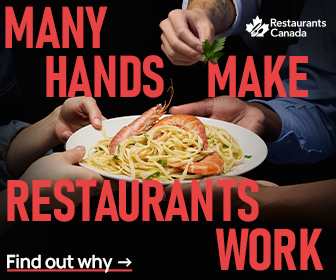One Industry, One Voice
Restaurants Canada is Unlocking the Power of Community
For more than 80 years, Restaurants Canada (RC) has been the national voice of the foodservice industry, advocating for policies that support growth, providing industry insights, and fostering connections across the sector. Much like the industry it represents, RC thrives on collaboration, adaptability and innovation. And, just as restaurant operators continuously refine their approach to stay competitive, RC is doubling down on its commitment to advocacy, industry support, and member-driven solutions—ensuring it remains the most effective resource for Canada’s foodservice community.
“We want Restaurants Canada to be the first call operators make when they have a problem, a question, or a business challenge,” says Tracy Macgregor, RC’s Chief Operating Officer. At the centre of this effort is Paljor Dolma, RC’s Senior Manager of Member Marketing and Engagement, who is focused on helping members unlock the full value of their membership. Whether it’s guiding operators to the right industry connections, advocacy initiatives, or business resources, Dolma ensures that members not only have access to solutions but know exactly how to use them.
Through quarterly Virtual Town Halls, an expanded slate of in-person and virtual meetings, and new networking opportunities, RC is ensuring that the same sense of connection and support that defines the restaurant industry is reflected in the association itself. Just as foodservice operators rely on their teams, suppliers and peers to navigate challenges, RC is strengthening its role as a key resource and strategic partner.


Building Year-Round Engagement
For years, RC Show—a single, massive event where foodservice leaders gather to discuss trends, innovations, and advocacy priorities—has been the gathering place for the industry and the centrepiece of the Restaurants Canada’s engagement efforts. But one thing was missing: year-round connection. “When I first joined RC, I noticed that there were very few regular, ongoing member events,” Macgregor recalls. “Everything was centred around RC Show. That needed to change. With the accelerating pace of the industry, getting together once a year, while amazing, is just not enough.”
In 2024, RC committed to expanding its national engagement strategy, rolling out Virtual Town Halls, regional networking receptions, and focused industry meet-ups to keep conversations going and connections growing. “We’re restructuring things—moving key events, like the Restaurants Canada Awards of Excellence, out of RC Show and into a new fall gala event. We’re launching new programs to elevate women in the industry, and creating more spaces for networking,” Macgregor says. “Because connections matter. We are focused on making sure all operators, across all segments have a place and a reason to connect with us and with each other.”
When I first joined RC, I noticed that there were very few regular, ongoing member events,” Macgregor recalls. “Everything was centred around RC Show. That needed to change. With the accelerating pace of the industry, getting together once a year, while amazing, is just not enough. — Tracy Macgregor
Making Advocacy More Accessible
Macgregor and Dolma understand that, for many restaurant operators, industry advocacy can feel distant. Policies change, regulations shift and major decisions affecting foodservice happen at levels that may seem disconnected from the day-to-day realities of running a restaurant. But those decisions are shaped by the voices of operators—when they engage. The challenge is ensuring those voices are heard in a way that drives real change.
That’s exactly the gap RC’s new Quarterly Virtual Town Halls are designed to bridge. “These sessions aren’t just about delivering information—they’re about hearing directly from members and turning their concerns into action,” says Dolma. “We launched the Virtual Town Halls in February to provide operators with a direct channel to RC’s leadership, allowing them to ask questions, provide feedback, and gain clarity on the industry-wide issues affecting their businesses.” The sessions include a review and discussion of the research findings in the most recent edition of The Quarterly Canadian Restaurant Intelligence Report, produced by Chris Elliott, Restaurants Canada’s Chief Economist and VP Research, and the RC research team. “It’s one thing to send out a report,” adds Macgregor, “But these sessions allow operators to ask questions specific to their business, plan ahead, and actually apply insights to their business strategies.”
We launched the Virtual Town Halls in February to provide operators with a direct channel to RC’s leadership, allowing them to ask questions, provide feedback, and gain clarity on the industry-wide issues affecting their businesses. — Paljor Dolma
Beyond the ability to engage directly, the town halls are making advocacy feel more personal and immediate. “Operators don’t just see a report—they see the people behind it,” Macgregor explains. “They put faces to the team advocating for them, and that makes it more real. They’re not just reading an email; they’re having a conversation.” That distinction is important. When members understand the work being done on their behalf and have the opportunity to voice their concerns in real time, it builds stronger trust and alignment between operators and the association representing their business.
Macgregor also points out that advocacy isn’t just about making noise—it’s about delivering results.
“Every time we meet with policymakers, the first question we’re asked is: “Do you have the data to back that up?” Macgregor also stresses that without strong, segmented data reflecting the realities of operators across different provinces and business models, it becomes much harder to push for meaningful policy change. “Some provinces—like Quebec, Manitoba and parts of Atlantic Canada—struggle to get enough participation to provide region-specific data,” she explains. “And without it, it’s harder to move the needle with government.” The solution is simple: more members engaging in surveys, town halls, and research initiatives means stronger data, clearer insights, and more compelling arguments when it comes time to negotiate with policymakers.
Taking just a few minutes to respond to RC’s surveys helps shape not only advocacy efforts but also the resources, supports and industry partnerships RC develops to address member pain points. These surveys provide critical insights into the challenges and priorities of foodservice operators, allowing RC to push for policy changes, negotiate better business supports, and build strategic partnerships that deliver real value to members. “Every response, every data point, every shared experience adds weight to our voice,” says Tracy MacGregor, RC’s Chief Operating Officer. “And when that happens, change follows. We use surveys sparingly because we know how busy our members are, but we send them to ensure our advocacy work is optimized and the supports we invest in are aligned with what matters most.”


Focused on Member Success
One of the biggest shifts within Restaurants Canada (RC) is a deeper, more proactive approach to member engagement—not as a transactional relationship, but as a strategic partnership. At the centre of this effort is Dolma, whose work is focused on ensuring that every RC member gets maximum value from their membership. “My role is really about member success,” says Dolma. “It’s not just about signing people up for membership—it’s about making sure they get the most value out of it.” That means ensuring operators don’t just have access to resources, but that they know exactly how to use them—whether it’s advocacy support, networking opportunities, or business tools designed to help them navigate industry challenges.
This shift reflects a broader, enterprise-wide focus within RC—one that positions the organization as the first call operators make when they need solutions or support. “We want operators to see us as their go-to resource,” Macgregor explains. “If they don’t know where to get an answer, they should know that someone here will connect them to the right person, tool, or solution. No matter who they come to at RC, they should be able to get connected to the answer they need.” Part of Macgregor and Dolma’s mandate is to strengthen internal processes to make sure no member question or request falls through the cracks—and that every touchpoint leads to actionable support.
RC has implemented robust new member success programs and structured outreach initiatives that ensure members fully understand and utilize their benefits. “We need to be reminding members of all the benefits they have access to,” Macgregor says. “Whether it’s through an online call, an orientation session, or an open Q&A—members should know what’s available to them and how to use it.”
This also means making key industry tools more accessible, from navigating the RC member portal and leveraging the Groupex group purchasing program to tapping into exclusive industry partnerships. “If we’re not proactively reaching out to members, they won’t always know what’s available to them,” Dolma emphasizes. “So, we’ve created more structured opportunities to encourage engagement. We’re focused on turning engagement into impact and ensuring that operators see RC as an essential business partner in their success.”
To learn more about Restaurants Canada member benefits, contact Paljor Dolma at: PDolma@restaurantscanada.org









